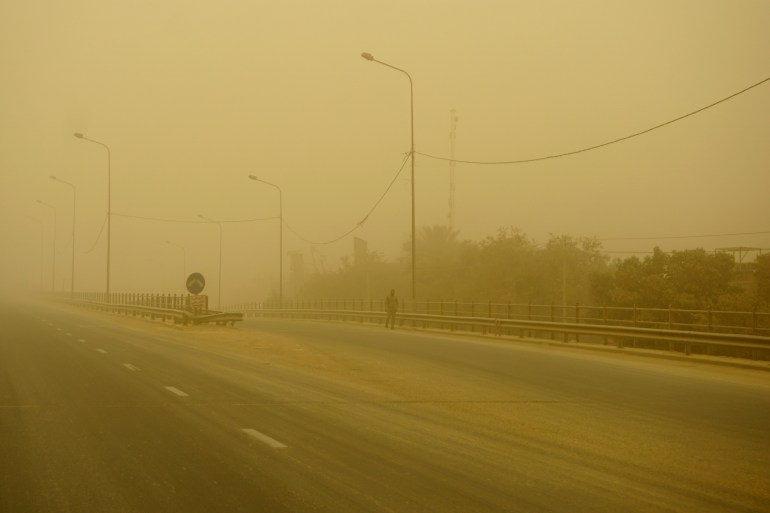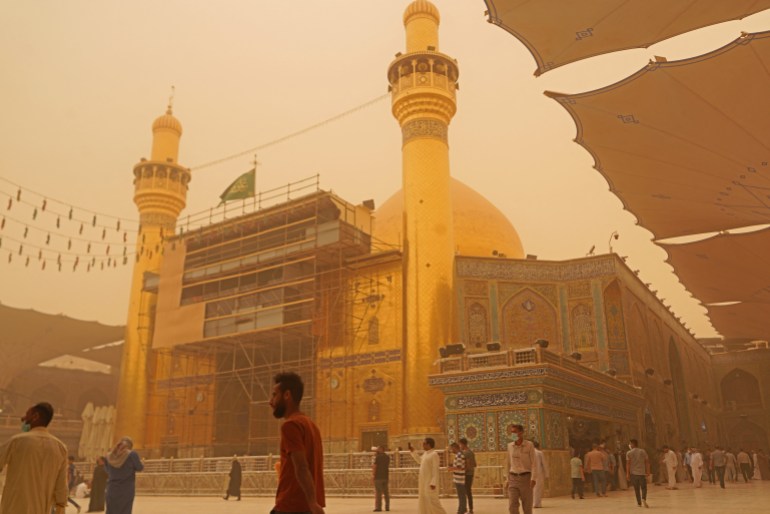Thousands sickened, one dead as latest severe sandstorm hits Iraq
Residents of six of Iraq’s 18 provinces, including Baghdad and Al-Anbar, hit by thick clouds of choking dust.

One person died and more than 5,000 were treated in hospitals for respiratory ailments as the latest severe sandstorm swept across Iraq, the health ministry said.
As the seventh storm in a month hit Iraq on Thursday, the capital city Baghdad and the holy city of Najaf were shrouded in ghostly orange clouds of choking dust.
Keep reading
list of 3 itemsEstimated 3,000 people flee armed clashes in northern Iraq
Missile attack causes fire in Iraqi oil refinery: Officials
“One death has been recorded in Baghdad” and hospitals “have received no less than 5,000 cases so far”, health ministry spokesman Seif al-Badr said in a statement on Thursday.
Those hit hardest are people suffering from “chronic respiratory diseases such as asthma”, and the elderly who suffer in particular from heart ailments, he said.
Badr said the majority of those seeking hospital treatment were later discharged and most cases were of “medium or low intensity”.
Dust storms have increased dramatically in frequency in Iraq in recent years, driven by soil degradation and intense droughts made worse by climate change, with rising average temperatures and sharply lower rainfall. The fine dust particles can cause health problems such as asthma and cardiovascular ailments, and also spread bacteria and viruses as well as pesticides and other toxins.

Residents of six of Iraq’s 18 provinces, including Baghdad and the vast western region of Al-Anbar, awoke on Thursday to a thick cloud of dust blanketing the sky.
Authorities in Al-Anbar and Kirkuk provinces, north of the capital, urged people “not to leave their homes”, the official INA news agency reported.
Hospitals in Al-Anbar province had received more than 700 patients with breathing difficulties, said Anas Qais, a health official cited by INA.
The central province of Salaheddin reported more than 300 cases, while Diwaniya and the province of Najaf, south of Baghdad, each recorded about 100 cases, the news agency added.
Flights scheduled to depart overnight and on Thursday morning were postponed, an airport official told The Associated Press news agency, speaking on condition of anonymity because he was not authorised to talk to reporters.
Flights resumed by the afternoon, when the dust began to clear.
Climate change
The storms are expected to grow more intense with worsening climate change because higher temperatures and more irregular rainfalls dry out land faster and accelerate desertification.
Oil-rich Iraq, despite its mighty Tigris and Euphrates rivers, is classified as one of the world’s five countries most vulnerable to climate change and desertification.
Scientists say climate change amplifies droughts and that their intensity and frequency in turn threaten food security. Experts have said these factors threaten to bring social and economic disaster to the war-scarred country.

In November, the World Bank warned Iraq – a country of 41 million people – could suffer a 20 percent drop in water resources by 2050 due to climate change. The United Nations says about one-third of Iraq’s population now lives in poverty.
The effects of low rainfall have been exacerbated as the levels of the Tigris and Euphrates drop because of upstream dams in neighbouring Iran and Turkey.
In early April, a government official warned Iraq could face “272 days of dust” a year in coming decades.
Azzam Alwash, head of the Nature Iraq non-profit organisation, warned that “climate change alone doesn’t give the whole picture” and that inappropriate farming practices and mismanagement of water resources have contributed to the problems.
“Climate change has become a very convenient excuse for officials to avoid responsibility for not taking action over the last 20 to 40 years,” he said.
Desertification, resulting from old irrigation practices dating back to the Sumerian age, and rising water salinity are also factors, Alwash said.
“These are policy issues,” he said.